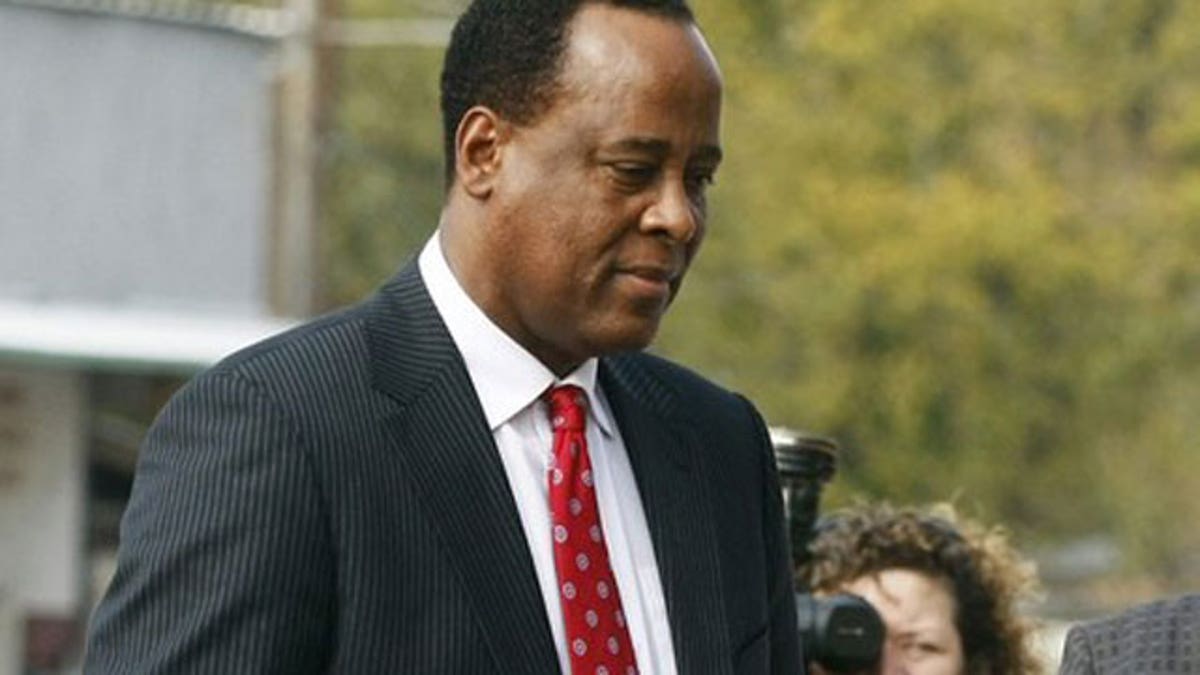
FILE: Dr. Conrad Murray is seen outside a Los Angeles courtroom in this 2010 file photo. (AP)
Jurors in the trial of Michael Jackson's doctor got a crash course Wednesday on the anesthetic propofol from an expert who showed them a graphic video of what he said was the right way to administer the drug that's blamed for killing the King of Pop.
The video included numerous safety measures that were not employed by Dr. Conrad Murray when he administered the drug to Jackson as a sleep aid at the singer's home according to testimony.
Dr. Steven Shafer, a professor who wrote the package insert that guides doctors in the use of the anesthetic, lectured the panel as if they were in a classroom. He narrated while the silent video took jurors into an operating room to see the specialized equipment and procedures.
Shafer said standards and safeguards are essentially any time anesthesia is given to a patient.
"The worst disasters occur in sedation and they occur when people cut corners," Shafer said.
In Jackson's case, he said, "virtually none of the safeguards were in place."
At one point during the video, Shafer noted that the doctor in the video was taking copious notes.
"Moment by moment, the anesthesiologist writes down everything that happens, as diligently as you are doing here," he said as jurors scribbled in notebooks.
Testimony has shown that Murray took no notes on his treatment of Jackson and didn't record his vital signs on June 25, 2009, the day Jackson died.
"The record is not just some static document," Shafer said. "It's fundamental to the care that is given."
He also said Jackson should have signed a written informed consent form to show he knew the danger of his treatment.
"Verbal informed consent is not recognized," he said. "It does not exist."
Shafer, a practicing anesthesiologist who teaches at Columbia University Medical School in New York, said he was testifying for the prosecution without a fee because he wants to restore public confidence in doctors who use propofol, which he called a wonderful drug when properly administered.
"I am asked every day in the operating room, `Are you going to give me the drug that killed Michael Jackson,"' Shafer said. "This is a fear that patients do not need to have."
He said he has not charged for testifying in recent years because "there's a personal thing about not profiting from a medical misadventure" and he doesn't want to be accused of compromising his integrity.
Shafer, who edits journals on anesthesia and is widely published on the subject, gave jurors a demonstration from the witness stand of how propofol is drawn into an IV bag with a large syringe. He produced a bottle of the white substance that Jackson referred to as his "milk" and showed the steps involved, which took several minutes.
The explanation by Shafer and the depiction in the video seemed to belie an early defense claim that Jackson could have administered the drug to himself. The process shown Wednesday appeared too complicated for self-administration.
The video also suggested the only place for propofol to be administered properly is in a hospital with medical personnel on hand. The video showed a printed warning if problems arise: "Call for Help!"
"You have to respond instantly," said Shafer. "If there is a problem you call for help before you treat because you're going to need it."
Murray, who has pleaded not guilty to involuntary manslaughter, told police he delayed calling 911 because he was giving Jackson CPR.
Murray has acknowledged giving Jackson doses of propofol in the superstar's bedroom as a sleep aid. However, his attorneys have said the amount of propofol given to Jackson on the day he died was too small to cause his sudden death at age 50.
Chief defense lawyer Ed Chernoff objected to showing the video, but Superior Court Judge Michael Pastor said it was relevant. He ordered a few segments excised by Deputy District Attorney David Walgren before he presented it.
Shafer is the final prosecution witness in the trial, now in its fourth week.
Murray's attorneys will begin calling witnesses Friday. They plan to call 15 witnesses, including police detectives, character witnesses and Randy Phillips, the head of AEG Live, the promoter of Jackson's planned series of comeback concerts.
Chernoff said the defense should rest its case by Wednesday.
Murray's attorneys are also going to call one of Shafer's colleagues, Dr. Paul White, as an expert to try to counter the prosecution case.














































